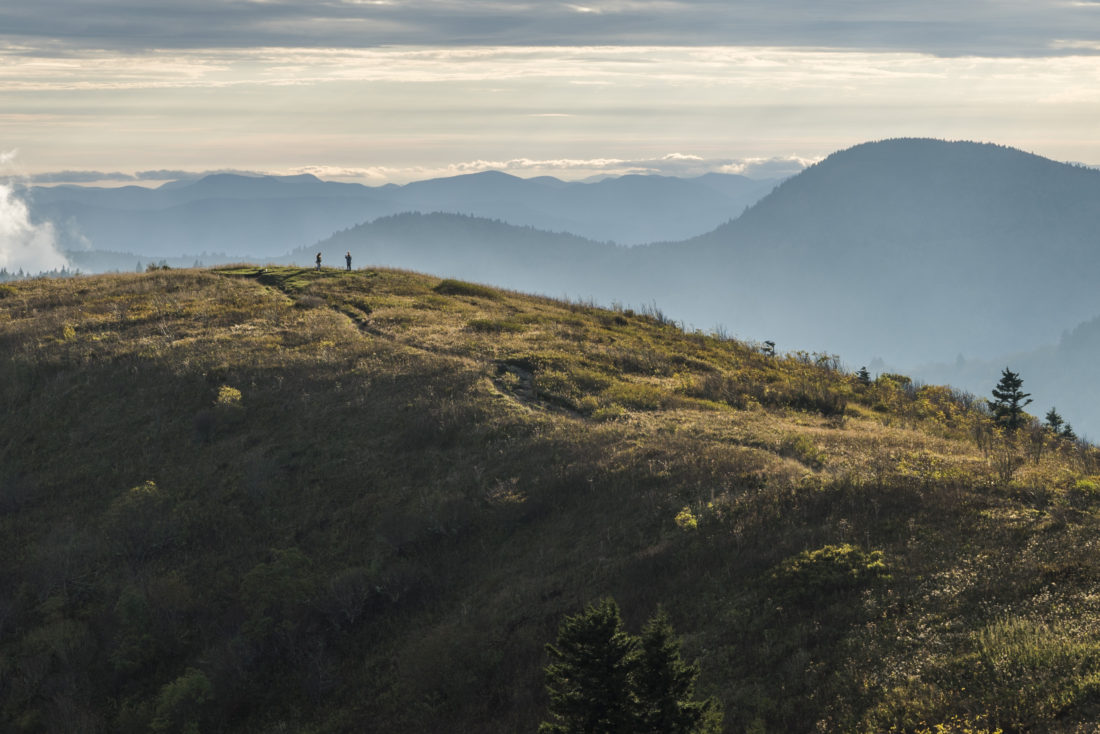Nearly a decade after the U.S. Forest Service launched the process for updating its management of the Pisgah and Nantahala national forests, an end is in sight. On Jan. 21, the USFS released a final draft plan that will cover over 1 million acres of public land in Western North Carolina for the next 15-20 years.
“The forest plan creates the framework for us to work with partners into the future to successfully address major challenges like climate resilience and sustainable recreation,” wrote James Melonas, supervisor of the National Forests in North Carolina, in a press release announcing the plan. “Ultimately, we are focused on the opportunities we have to keep these national forests healthy so they can continue to supply clean water to communities, contribute to the region’s economy and be a place of respite and recreation.”
In his draft record of decision, an explanatory document issued alongside the plan, Melonas wrote that USFS will increase currently underrepresented young and open forest ecosystems across the landscape. Active practices, such as logging and controlled burning, will be balanced with the preservation of large undeveloped spaces, such as the recommended Craggy National Scenic Area. And a focus on “sustainable recreation” will boost the forest’s trail system to address public demand.
But Will Harlan, an Asheville-based campaigner with the national nonprofit Center for Biological Diversity, raised concerns that the plan would expand cutting in mature forests. “Our publicly owned national forests are far more valuable standing than chainsawed down,” wrote Harlan in a Jan. 21 press release. “Protecting drinking water, clean air, scenic views, iconic trails and old-growth forests will provide far more benefits than board feet of timber.”
Although public comment on the plan is closed, people and organizations who previously submitted comment are eligible to file objections through Monday, March 21. More information on the objection process is available at avl.mx/b6j or by contacting Michelle Aldridge with the USFS at 828-257-4200. All plan documents can be reviewed at avl.mx/b6k.
Petition filed to protect bog turtle
Multiple Western North Carolina wetlands are home to the bog turtle, the smallest turtle species in North America. As habitat loss and poaching continue to threaten the turtle’s survival, Defenders of Wildlife — a national nonprofit with an Asheville-based Southeast branch — has filed a petition with the U.S. Fish and Wildlife Service to list its Southern population as threatened or endangered.
Although the bog turtle’s Northern population has been federally listed as threatened since 1997, no such protections are in place for Southern turtles, even as their habitat has declined by more than 80% over the past century. Climate change poses a further danger to the turtle by potentially drying up the bogs they rely upon.
“Losing even a single mature bog turtle can devastate a local population, and we’ve already lost thousands,” said Katherine Diersen, Southeast representative at Defenders of Wildlife, in a Jan. 27 press release announcing the move. “The plagues of illicit collection, habitat loss, disease and climate change have put them squarely on the path toward extinction. The Fish and Wildlife Service must protect them while there is still time.”
The FWS has 90 days from the filing of the petition to determine if a threatened or endangered designation may be warranted. The next step would be a yearlong review of the bog turtle’s status, followed by a 60-day public comment period.
Community kudos
- UNC Asheville biology professor Rebecca Hale received the university’s inaugural Steve and Frosene Zeis Professorship, a two-year award supporting biomedical or biochemical research. Hale’s project will study the genetic and neurological basis of mating behavior in the native marbled salamander.
- Hendersonville-based nonprofit Conserving Carolina protected roughly 700 acres of forest in the city of Brevard’s watershed. Conservation easements on the property, which forms Tarklin Branch, a tributary of Cathey’s Creek, were donated by the Polchow family, who has owned the land since 1963.
- The city of Asheville released a screening tool to help city staff evaluate projects, budget issues and policies through a climate justice lens. The effort aims to ensure all residents have “access to information, relationships, land and resources needed to have sovereignty and self-direction in response to climate crisis events and long-term sustainability that is community-led, deeply informed, organized, prepared for rapid response and well-resourced.” More information is available at avl.mx/b6t.
-

HELPING HANDS: AmeriCorps volunteers based at Lake Logan are working to restore Haywood County homes damaged by Tropical Storm Fred. Photo courtesy of Ingles Markets A team of AmeriCorps volunteers is helping repair Haywood County homes and property damaged in Tropical Storm Fred. The group of nine young people, ages 18-24, is operating out of Lake Logan and will also work to restore historic structures and a dock on the property. Ingles Markets will support the team with food, water and cleaning supplies.
- The Blue Ridge Parkway Foundation elected new officers to its board of trustees, with Henderson County Manager John Mitchell becoming chair and Bob Stout, a retired regional president of US Foods from Blowing Rock, becoming vice chair. The nonprofit’s council of advisers also welcomed Sam Johnson, a business adviser and fly-fishing author, and Ken McFadyen, director of economic development for Botetourt County in Virginia.
- Asheville filmmaker Garrett Martin is producing a documentary, The Great Forest, about efforts to conserve the Pisgah and Nantahala national forests. A teaser for the film is available at avl.mx/b6g; Martin has also launched a Kickstarter campaign to support its completion at avl.mx/b6h.
Opportunity knocks
- Nominations are open through Friday, Feb. 25, for the Western North Carolina Agricultural Hall of Fame, administered by Asheville nonprofit WNC Communities. New inductees will be named in August at the WNC Ag Center in Fletcher, where the hall was recently relocated for permanent display. More information and a nomination form are available at avl.mx/b5j.
- Black Mountain gardeners have until Monday, March 14, to apply for the 2022 Seed Money Award. Organized by the Black Mountain Beautification Committee, applicants can win up to $1,500. Projects should reflect the committee’s mission of “honoring the natural beauty of the surrounding mountains while seeking to reflect that beauty on the streets and in the lives of the citizens.” More information and an application form are available at avl.mx/b5l.
- Nonprofits and local governments can now apply for funds to carry out flooding reduction projects through the N.C. Soil and Water Conservation Commission’s Streamflow Rehabilitation Assistance Program. Eligible work includes clearing debris from blocked streams and stabilizing streambanks. Applications for the first grant period will be accepted through Thursday, March 31; more information is available at avl.mx/b5m.
- The Wander School, a Burnsville herbalism education nonprofit, is offering scholarship and work-trade opportunities for its Wildcrafted Herb School program (avl.mx/b6i). One scholarship slot will be reserved for a student who is Black, Indigenous or a person of color; two partial work-trade slots will be available on a first-come, first-served basis for anyone with financial need. More information is available by emailing Abby Artemesia at Abby@TheWanderSchool.com.
Save the date
- The Southern Appalachian Highlands Conservancy will hold a volunteer workday at Chestnut Mountain near Canton Friday, Feb. 18, 9 a.m.-4 p.m. Volunteers will join SAHC and the Hemlock Restoration Initiative to help protect hemlock stands against the invasive hemlock wooly adelgid. More information and registration is available by emailing Sarah Sussman at Sussman@Appalachian.org.
- The Appalachian Sustainable Agriculture Project will present two fairs to connect residents with local community-supported agriculture programs. Events will take place 4-7 p.m. Thursday, Feb. 10, at the Hendersonville Community Co-op and Friday, March 11, at the YWCA of Asheville. Full Share, an online guide to CSAs, is also available online at avl.mx/b6f.
- ASAP’s 19th annual Business of Farming Conference returns Saturday, Feb. 26, to the Mission Health/A-B Tech Conference Center. New sessions this year include talks on farm employment, market opportunities at food relief sites and building an online presence. More information and registration is available at avl.mx/b5k.
- The Buncombe County Soil and Water Conservation District’s annual seedling sale is accepting orders through Sunday, Feb. 27, for pickup Thursday-Friday, March 3-4. Offerings include mulberries, persimmons, pawpaws, redbuds and dogwoods. More information and prices are available at avl.mx/wordcap0.



Before you comment
The comments section is here to provide a platform for civil dialogue on the issues we face together as a local community. Xpress is committed to offering this platform for all voices, but when the tone of the discussion gets nasty or strays off topic, we believe many people choose not to participate. Xpress editors are determined to moderate comments to ensure a constructive interchange is maintained. All comments judged not to be in keeping with the spirit of civil discourse will be removed and repeat violators will be banned. See here for our terms of service. Thank you for being part of this effort to promote respectful discussion.